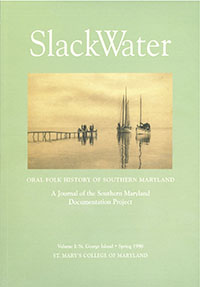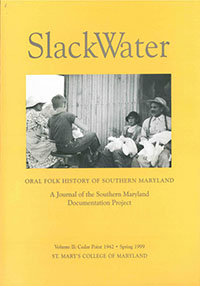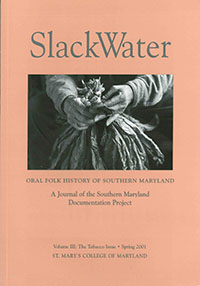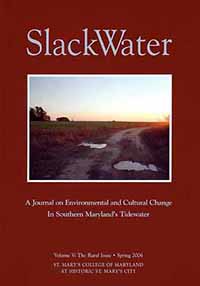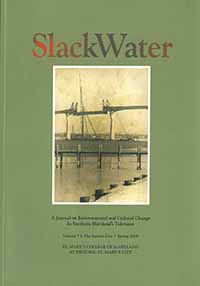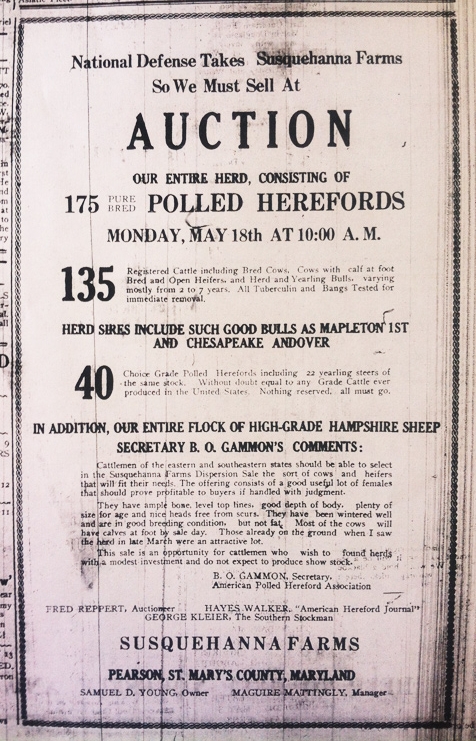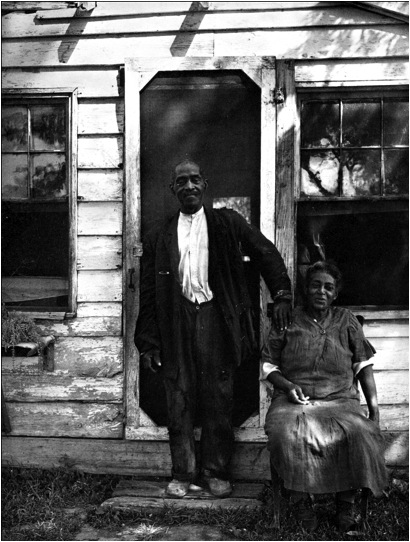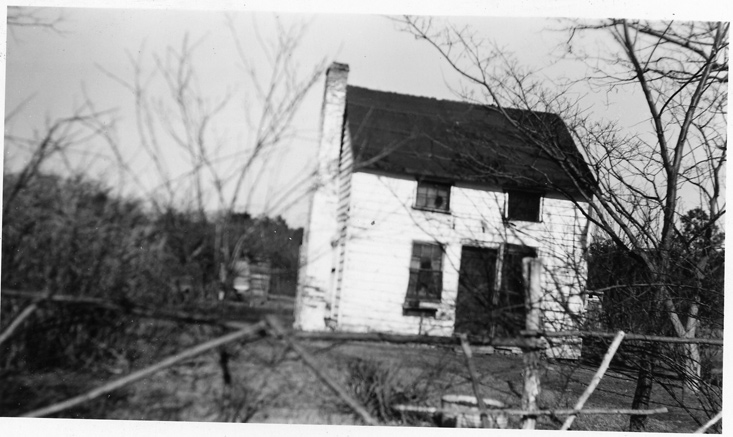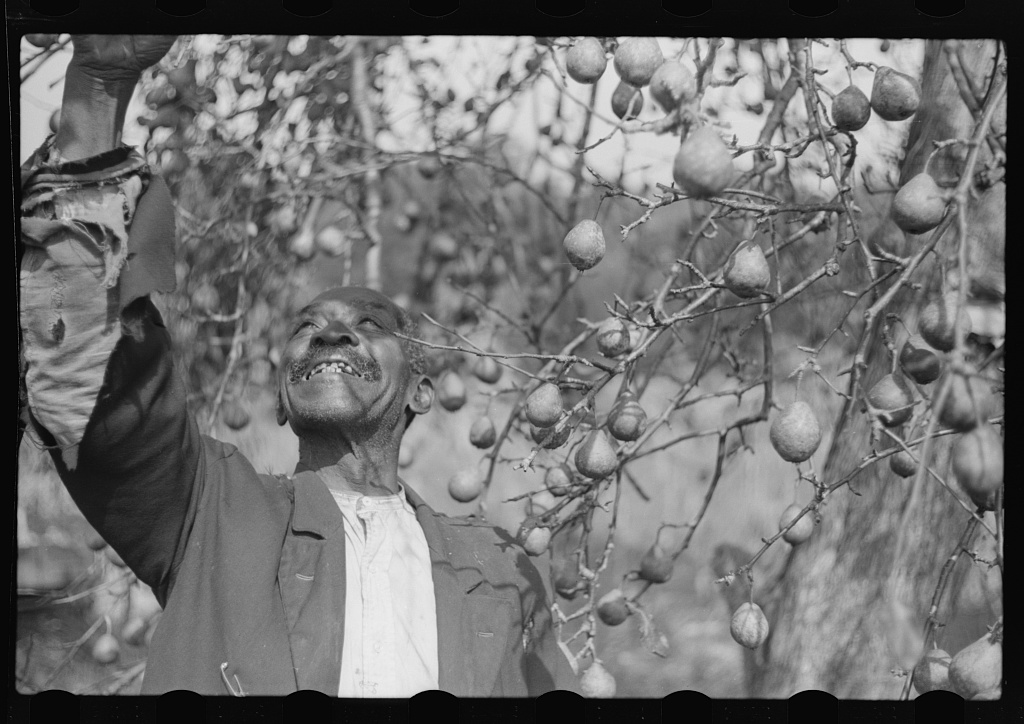Takings
I'll tell you how fast it was. Pearl Harbor was the seventh of December, the thirteenth we had the notice with a twenty penny nail driven through it right to the front door of our house. It was about that thick [holds finger and thumb apart] and it had everybody's name listed, the farms they owned, the persons that lived [there] and everything. You will vacate this property by the seventeenth of April 1942.
Richard Mattingly
-----
We knew from Mister Young, who [owned Susquehanna Farm] and lived in Grand Rapids, Michigan, and was a great friend of Senator Vandenberg's and they were all fighting it tooth and nail and the consensus was, if there had not been a war well, they never would have gotten the property because there was enough political clout, but there was the war and that was that.
Mary Mattingly Pfeiff
-----
It was a very emotional time for Mother and Daddy particularly. When the machinery was sold, really, there was not that much emotion because it was inanimate I guess is the best way to put it. But when we ended the dispersal sale of the purebred herd, that hit very hard. Especially Mother, because Mother was the one that kept all the records for each individual cow, the offspring and all the rest of the bookkeeping that is required to maintain your herd's purebred status and good standing. And that's when some bitter tears were shed. I can remember both Mother and Daddy sobbing their hearts out. Of course Daddy brought some kind of foundation stock to Tudor Hall, but it was never the same because the expanse of the farm was so much different, so much smaller scale.
J. Maguire Mattingly
-----
(Note: The images at right depict the Dyson family described in this interview and their house at Fordtown. In one of those images, Mr. Dyson plays an accordion that may be the same instrument mentioned in this interview.)
[After the Navy came,] my grandparents [John and Louise Dyson] went to live in New Jersey. And on the corner there was a bar, an Italian had this bar. And that's where my grandfather used to go and where he spent his days talking about the water in St. Mary's County. And it was a very bad experience for him because he was living with strangers and he was worried about how the government had robbed him of everything they had worked for, had built up with their own hands. The government had taken everything and had given them nothing.
[In St. Mary’s County,] my grandfather worked the water. There were hotels and families that bought fish from him. These fish were caught on a hook and line; they were not caught on rod and reels. In St. Mary’s, they had everything. There was nothing they didn't have.
I came home [to New Jersey] from New York after the government had started breaking up land and tearing up everybody's place. My grandfather was sitting on the porch and I'll never forget it: he was playing his accordion, he was playing “Look Down that Lonesome Road.” And that is a very sad song. I said, "Grandfather, don't play that song, don't play that song. You know, play something, say something, let's dance it off."
But there was no pleasure in him, everything was gone. There was nothing you could bring up to him that wouldn't bring back St. Mary's County. And we never, we never wanted to remind him of St. Mary's County.
When I came home one day, Grandmother said he had been gone quite awhile and she didn't know where he was. I went to the bar and the man in the bar says that he had been talking about St. Mary's County and fishing at the old lighthouse. And it just came to me, someone take me to the nearest water spot. That's where my grandfather will be.
The police took me. And we went through these bushes and went down to the water, to the river. And Grandfather was sitting up on the bank. And I said, “Grandfather, why didn't you wait until I got home, I could've brought you down here.” He said, “Doesn't that look like Pearson’s over there, doesn't that look like Frank Aud's store?” I said, Grandfather, “You know Mr. Aud's store never looked like that.” He got up slow to go and then the policeman drove him around and said, next time you want to go to the water, I'm gonna pick you up [and take you].
I said to Grandfather, “When I come home on weekends, I'm going to take you and bring you up to the water and maybe take a fishing trip.” But we never made that trip.
And it's just sad when you think about it. The part that gets to me is all the older people, the black people in St. Mary's County that were around in Fordtown, those are the ones that I really knew, the ones around Fordtown. They don't have a damn thing to show where they can say, I bought, my mother, my father, my grandfather bought this out of the money they got for their home that the government took. Because they didn't get enough to buy anything, you see.
The government killed my grandmother and grandfather when they took that land from them, they did.
Edith Dyson Parker
-----
The first people that came down like Shupe and Taylor, Captain Griffen, they were almost apologetic. You know what I mean.
Richard Mattingly
-----
As soon as the war broke out, after Pearl Harbor and the Sunday before Christmas, my father was notified that we'd lose our home. We would be out before May. It was during the War, which is the only reason the Navy was able to do this, to confiscate land.
It was my first year of college. I wanted to be there before it was all gone. My father was given permission not to move until the week I got home from school in June.
The house was a rectangular house, two story, full basement. An A-roof. My grandfather built it. And, it was a heartbreaker when the Navy pulled in a bulldozer and bulldozed it into the basement and covered it up with dirt. This was the way they cleared the land, which was a real heartbreaker for those of us who had generations before us.
And, you want to know how my father and a lot of others reacted. The Navy paid the very least they could possibly pay. The large land owners went to court. And, I forget figures now. But it was something like three to four times what the Navy offered, the court awarded the owners.
My mother never went back [to the property] after her last day. She said she wanted to remember it as it was, not as the Navy moved in.
Nell Levay
-----
The people that had money could afford to go to court, and they took the Navy to court, or the government to court, and they got more money. Like Mattapany Farm and Susquehanna Farm and Cedar Point Farm and some of those people that had big farms, they could afford to take the government to court, they got more money. Little guy, he had to take what they gave him and try to find a place quick.
George Aud
-----
My parents didn't tell me too much about it. "A group of people will be coming to take over this place and we have to move out," they said, and they were wondering where they could move. That's all I heard them say at that time, and in ’42 we moved out. But they didn't talk about it too much. I do remember hearing my father say, "Gosh, they gonna take this fourteen acres here, and then they're gonna take the other land that we have along the road, it's going to go all the way. All of us, everybody here, Piney Hill, Fordtown, will have to move out and find places some other place."
There wasn't anything that could be done, once the Navy decided that was it.
And I believe our parents just had so much trust, believed that the people coming from Washington, with the Navy, would give them a fair deal, a fair chance, with the land, the number of acres that they had. But seeing what they got per acre, I had the feeling that they were just cheated out of so much. I think right up to this day, they were still cheated.
Ruth Elizabeth Portee
-----
I was working at Indian Head when I heard this base [Patuxent River] was coming. And, of course, all of us that was at that time working at Indian Head, we wanted to see if we could get back down close to home, ‘cause when I first went to Indian Head, I was staying in a hotel.
It really caused a lot of frustration because, you know, nobody likes to leave their home. And then the next thing was, they didn't know where they were going, because this was all rushed. My father had this pretty good tract of land and he sold quite a few [parcels], you know a space big enough to build houses, like two acres or an acre, something like that. When he sold the ground to these people, he wasn't in the real estate business, he just wanted to do anything he could to help these people.
He let them have it for $50 an acre. Since then, we are getting anywhere from $3.50 to $5 a square foot for this property. You can jump on your calculator and see what that is an acre now. 43,560 square feet into an acre and you get $5 for it. That's sizeable money.
Ogden Thomas
-----
The Navy sent people down, sent surveyors down to survey the farms. You see, they had to survey all this land over, all these farms and plots of land that people owned, they had to be resurveyed, and the exact boundaries posted out because sometimes, after maybe a hundred, two hundred years, boundaries rot down. They used to use locust posts for boundaries, or a cedar post, you know, drove in the ground. Today they have concrete markers mostly, but at that time, most just had wooden posts. Cedar and locust both were good wood that'd last a long time. A locust post will last in the ground probably seventy-five years.
That was the first we knew, when the surveyors came down. That was during the Christmas holidays, the last of December in ‘41.
The surveyors came down and then this notice was tacked on our door, on everybody's door, one day by the marshal. We didn't have any time to prepare for anything. They gave you thirty days to get out and then they took over.
They allowed some people longer than thirty days to finish moving. George Weschler [at Mattapany] had several hundred head of cattle to move. They was raising purebred cattle at the time, beef cattle like they have in the West. It took time to locate another place.
The people leaving, they all wanted to buy land somewhere else, but at that time everything tightened up. Land increased in value. Land values got high and places got harder to find all of a sudden.
George Purcell

